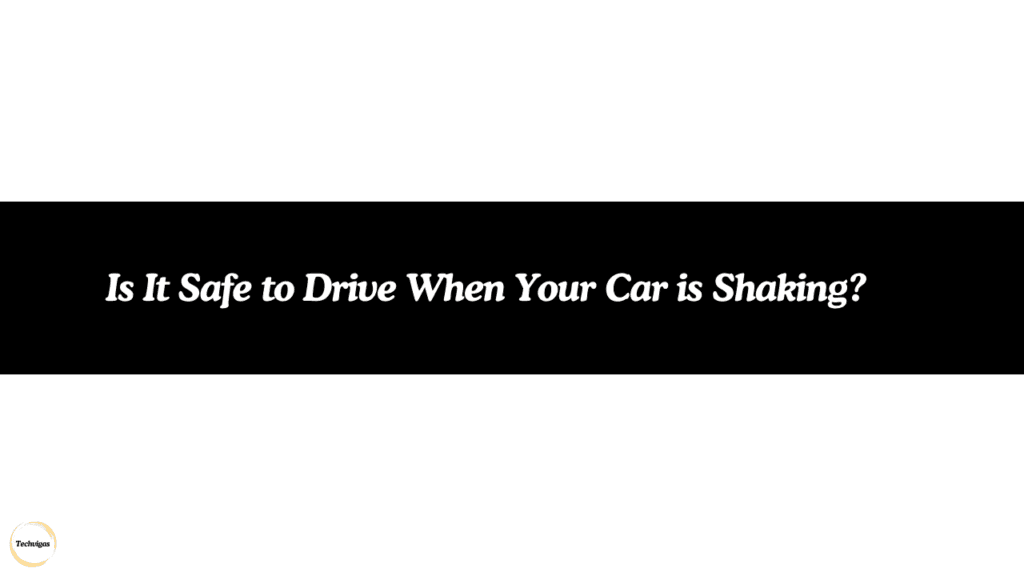Does your car feel shaky or make strange noises while driving? This unsettling sensation can range from a minor annoyance to a serious safety issue. Often, these problems arise from common causes like worn tires, unbalanced wheels, or even brake rotors that need attention. Ignoring these vibrations can lead to more costly repairs down the road, which is why it’s crucial to have your vehicle inspected and repaired as soon as you notice the first signs of trouble.
In my own experience, a slight shake turned into a bigger problem over time, affecting my vehicle’s overall performance. Luckily, regular maintenance and timely diagnosis helped me get my smooth ride back. This article will break down the most common reasons for a shaky car, helping you understand what could be causing it and how to resolve these issues effectively.
Whether it’s a misaligned suspension, engine problems, or just loose lug nuts, knowing the root cause of your car’s behavior will save you time, money, and unnecessary panic. So, let’s get to the bottom of why your car is shaking and get you back on the road with confidence!
Get your car regularly inspected and address any shaking issues promptly. This will help maintain a smooth ride and ensure your safety on the road.
Top Reasons Your Car May Be Shaking
Engine Problems
If your car starts to shake unexpectedly, it could be an engine malfunction. The problem often comes from small but critical parts like spark plugs or the engine air filter. According to the general rule, spark plugs usually last around 80,000 to 100,000 miles, depending on your vehicle’s make and model. It’s a good idea to check the spark plugs and their connections to ensure they’re in sound condition. If the spark plugs look okay, the next step is to check the air filter. A dirty or clogged air filter can starve the engine of the oxygen and fuel it needs to run properly, causing the car to shake or hesitate. By keeping these components in good shape, you can prevent serious engine problems and keep your vehicle running smoothly.
Brake Problems
If you notice a vibration while applying the brakes, the problem is likely related to your car’s front brake mechanism. The front brakes take on more stress when brakes are applied, and certain parts like the brake pads and rotors may need to be replaced over time. A warped rotor or worn brake pads can cause your vehicle to vibrate or shake. Since the rotor is a round metal disc that attaches to the wheel, heavy wear and tear can make it warp, reducing its ability to slow the vehicle properly. The pads press against the rotor to control speed, but if they become too worn, they can’t work properly, causing the car to feel unstable. It’s important to have these parts checked by a mechanic regularly, as brakes should typically be replaced every 50,000 miles. The timeline can vary depending on the vehicle’s make and model, so consult your owner’s manual or a professional for a more accurate replacement schedule.
Axle Problems
If your vehicle starts shaking, the problem might be related to the axles. Most vehicles have 2 axles—one connecting the front wheels and another connecting the rear wheels. A vibration can occur if any of these axles are bent or dented due to an accident or a mishap on the road. As you accelerate, the vibration may increase in intensity. It’s a good idea to inspect the axle and check the CV joints and driveshaft for any potential problems. Worn CV joints can let in dust and debris, which may cause severe damage over time. To keep your car running smoothly, make sure you address any issues with the joints promptly.
Wheel Problems
If your steering feels wiggly or your wheel wobbles while you drive, it’s likely due to problems with your wheels or wheel bearings. A vibration may occur when the wheels are not spinning properly. This could be because of worn-out bearings, loose tie rod ends, or damaged ball joints. When these parts are not functioning correctly, it can cause instability in your car, making it difficult to steer and putting your safety at risk. It’s essential to address any wheel problems promptly to keep your vehicle running smoothly.
Tires
If you’re experiencing a specific type of vibration, it could be related to your tires. Many drivers notice this problem when the vibration is felt at certain speeds. It’s often caused by tires that are not properly balanced or are wearing unevenly, which can make your car vibrate and feel unstable. One way to solve this issue is by getting a tire rotation or having the tires checked and balanced. Again, If the problem persists, you may need new tires to completely solve the vibration issue and get back to a smoother driving experience.
If Your Car is Shaking in the Winter, Try the Car Wash First
If your car starts to shake in the winter, it might just be a buildup of ice or snow on the rims from driving on slushy roads. When slush and debris get stuck on your vehicle’s rims and freeze, it can cause the car to feel like something is wrong with the engine, tires, or suspension. The best thing you can do is take your car through a car wash to melt and remove the gunk immediately. This simple step can often stop the shaking. If your vehicle is still shaking after the car wash, it’s time to get the issue checked and diagnosed by a professional to ensure there isn’t a more serious problem.
6 of the Most Common Reasons Your Car is Shaking

Old Tires
High-quality tires typically last three to five years. Once tires become worn or shot, you might notice a slight vibration in your car. Unevenly worn treads can lead to unalignment and an uncomfortable ride. Regular rotations every 5,000 to 7,500 miles and using a tire finder tool can help monitor their condition.
Unbalanced or Out-of-Round Tires
Unbalanced tires or those that are out of round can cause your car to shake due to irregular wear around the edge or middle of the tire. If left unchecked, this can damage your car’s suspension and shocks, leading to more severe issues down the road.
Damaged Wheels or Rims
A damaged wheel or rim that has lost proper contact with the road can cause vibration or shakiness in the steering wheel. Always inspect and replace any damaged wheels or loose lug nuts that might be causing instability.
Loose Lug Nuts
Loose lug nuts can vibrate against the thread and become extremely dangerous, potentially causing the wheel to come off while driving. Make sure the lug nuts are tightened properly to avoid any risk.
Out-of-Alignment Suspension
A suspension that’s out of alignment due to potholes, curbs, or accidents can wreak havoc on your vehicle’s suspension, making the car shake and feel unstable. Regular alignment checks are essential to prevent suspension issues.
General Vehicle Maintenance
Maintaining regular inspection and alignment services can catch any of these issues early, preserving the condition of your vehicle and ensuring your safety on the road. Taking care of small issues like uneven tires or damaged wheels will prevent them from turning into bigger problems.
The Timing of Your Car Vibrations Can Help Determine the Problem
If your car is shaking at specific times, it could indicate different problems. For example, if your car shimmies or shakes while idling, it might be due to loose engine mounts or worn connections between the engine and your car’s frame. This happens because the engine mounts are designed to dampen vibrations, so when they wear out, you can feel the vibrations throughout the car. On the other hand, if your car shakes while braking, it could be because of warped brake rotors or worn-out brake pads. Sometimes, even improperly lubricated guide pins can cause vibrations. If the issue occurs during accelerating, it might be related to unbalanced tires, loose lug nuts, or a damaged axle. A few other things to consider are the inner constant velocity joint, a bent drive shaft, or a broken motor mount. To solve these problems, regular vehicle maintenance and timely inspections are crucial to keep your car running smoothly.
Is It Safe to Drive When Your Car is Shaking?

If your car is shaking while driving, it’s not just uncomfortable—it’s a serious safety concern. Continuing to drive with a vibration can damage your car’s critical parts and reduce its longevity. The best way to protect yourself and your car is to visit a mechanic as soon as possible for a thorough diagnosis. Ignoring the problem can lead to more costly repairs or even accidents on the road. Make sure you have the right auto insurance coverage, and don’t take any chances when it comes to your safety. With the correct maintenance and regular check-ups, you can keep your vehicle running smoothly and avoid any unexpected issues while driving.
Repair Your Shaky Car
If you want to fix your shaky car and get back to a smooth ride, it’s essential to keep your vehicle in good condition. Regular tire rotations and alignments can prevent minor issues from turning into bigger problems. An expert service can not only improve your ride but also ensure safety on the road. Whether it’s a quick check-up or more detailed maintenance, keeping up with these services will help maintain the smooth driving experience you expect from your car.
Ask The Professionals
When it comes to your car’s performance and safety, it’s paramount to address any signs of shaking as soon as they appear. Whether it’s a simple fix like replacing worn spark plugs or something more complex like transmission issues, finding the root problem early can prevent expensive repairs and potential danger down the line. A thorough inspection by a team of experts is often the best way to keep your car running smoothly and ensure that minor vibrations don’t turn into major problems. Regular check-ups can help maintain your vehicle’s performance, extend its lifespan, and keep you safe on the road. Prioritizing your car’s health is essential for a worry-free drive.
Conclusion
A shaking car can be more than just a minor inconvenience—it can signal deeper problems that could affect your vehicle’s performance and safety on the road. Whether it’s due to old tires, worn brake pads, unbalanced wheels, or a more complex issue with the engine or suspension, diagnosing the root cause early can save you from expensive repairs and keep you safe. By performing regular maintenance and seeking professional help when needed, you can ensure your car stays in top condition and enjoy a smooth ride for years to come. Don’t ignore the signs—take action to protect both your vehicle and yourself.
FAQs
Yes, a misaligned suspension can lead to uneven tire wear, causing your car to shake, especially at higher speeds.
This could be due to engine-related issues like faulty spark plugs or worn motor mounts, which can create vibrations during startup.
If the shaking is severe or gets worse, it’s best to stop driving and get your vehicle inspected immediately to avoid potential safety risks.
A sudden shaking can be caused by various issues like unbalanced tires, engine problems, or a damaged suspension. It’s best to get your car inspected immediately.
A shaking or shuddering car might be due to worn-out brake pads, loose engine mounts, or transmission issues. Proper diagnosis can identify the root cause.
If your car shakes when parked, it could indicate an issue with the engine idle speed, spark plugs, or a problem with the fuel system.
A slight shaking can be normal, especially on uneven roads, but consistent vibrations could indicate mechanical issues that should be addressed.